|
|
|
Sort Order |
|
|
|
Items / Page
|
|
|
|
|
|
|
| Srl | Item |
| 1 |
ID:
183672
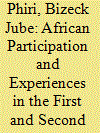

|
|
|
|
|
| Summary/Abstract |
Unlike existing studies that examined each of the two World Wars and Africans separately, this study explores African participation and experiences in the First and Second World Wars in Northern Rhodesia (colonial Zambia) together during the period, 1914–1948. A lot has been written on the history of the World Wars in colonial Africa. However, there is not much literature that focuses on African participation and experiences during the two world wars. This study is focused on the core theme, that is, the role played by Africans in both World Wars. This is the main theme that informs the study. The core theme is sub-divided into the following three sub-themes: the making of the Northern Rhodesia Police under the British South African Company, BSACo, a Chartered Company that prohibited by law from housing a standing; recruitment of personnel for the Northern Rhodesia Regiment; the role played by traditional authorities in the recruitment of ‘Askari’ – the Foot Soldiers and the ‘Tenga-Tenga’ War Carriers and the role of government propaganda while bringing to the fore African agency during both Wars. Also discussed in the study is the demobilisation process in which African servicemen – the Foot Soldiers and the ‘Tenga-Tenga’ War Carriers – felt cheated by an Empire-wide system of racial discrimination and hierarchy. Although an expanded government propaganda machinery contributed to the growth of an African political voice in Northern Rhodesia during the period, 1914–1948, that political voice neither included nor translated to much debate or discussion about the concerns of African ex-servicemen and their personal affairs. The study equally examines how their state of affairs affected the relationship between the ex-servicemen and their traditional leaders who were active in the recruitment process that brought them into the Wars in the first place. The study concludes with the re-examination of the older arguments that African servicemen did not play an active role in nationalist politics after the World Wars, and submits otherwise, that is, that they actually did.
|
|
|
|
|
|
|
|
|
|
|
|
|
|
|
|
| 2 |
ID:
117422
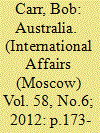

|
|
|
|
|
| Publication |
2012.
|
| Summary/Abstract |
FROM CONVOY GUARDIANS, through Cold War tensions, to partners in the Asia-Pacific, Australia-Russia relations have come a long way in 70 years.
The relationship between Australia and Russia long pre-dates the establishment of diplomatic relations 70 years ago. It reaches back to the first arrival of a Russian vessel in an Australian port more than two centuries ago. It spans the conflicts of the Crimean War of the 19th century, and the World Wars and Cold War of the last century. In this century it has developed to include increased trade between our two countries; cooperation in the Asia-Pacific through APEC and the East Asia Summit; and cooperation globally through the G20 and the World Trade Organisation.
|
|
|
|
|
|
|
|
|
|
|
|
|
|
|
|
| 3 |
ID:
152047
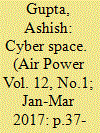

|
|
|
| 4 |
ID:
183677
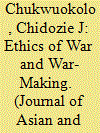

|
|
|
|
|
| Summary/Abstract |
Wars are cataclysmic events that inflict horrendous damage on people and society. In the case of the two World Wars whose magnitudes were global, and manners of prosecution total, this assertion pales in logic. The dangers that a future global war could pose for humanity given the tremendous leaps forward in the science and technology of warfare and weapons since the last World War are tremendous. This paper aims to use the examination of the ethics of war and warfare as backdrop on the analytical assessment of the implications of the exclusion of Africans from both the memorial and monuments that honor soldiers and their service in the two World Wars, even though their service and sundry contributions are salient and tremendous. The paper calls up the issue of racial identity in both Wars in puzzles: Do African soldiers in the Wars share a common humanity with their White counterparts? If they do, another puzzle is the following: Why then is their service still being commodified, to the extent of exclusion in memorials and monuments to soldiers that served and died in both Wars? The damning extrapolation from these puzzles is that there is still the belief albeit erroneous, in the establishment circles that regardless of the facts of history about the Wars, Africans are still viewed as lacking in contributions to the resolution of the threats that the World Wars represented to global peace. To reposition that under laying mind-set, the paper recommends the inclusion of African values of complementarity and inclusiveness in the quest for lasting global peace and the prevention of future Wars.
|
|
|
|
|
|
|
|
|
|
|
|
|
|
|
|
| 5 |
ID:
130233
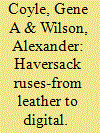

|
|
|
|
|
| Publication |
2014.
|
| Summary/Abstract |
The historical record of a country allowing false documents to fall into the hands of its enemy in order to deceive him goes back at least as far as the third century B.C., when Hannibal fought the Romans. 1 Yet, the ploy of misleading an enemy through the "passage" of fake documents to the other side probably reached its zenith during the twentieth century's First and Second World Wars, especially with a few spectacular cases involving an allegedly wounded courier and, once, even a dead one. Because of the famous British deception ploy in Palestine against the Turks in 1917, most all such deceptions came to be known as "haversack ruses." The king of all such ruses, at least in terms of being the best-known through numerous books and even a movie, was Operation MINCEMEAT of World War II. This elaborate British ploy of 1943 employed a dead body, a submarine to deliver it off the coast of Spain, false documents to deceive Germany's Adolf Hitler about the date and location of an anticipated Allied invasion of southern Europe, and the painstaking creation and backstopping of "The Man Who Never Was."
The purpose of examining variations of this type of ruse is to determine if these ploys featured any common characteristics, as well as any commonality in the backgrounds and personalities of the people who came up with or implemented such ideas. Did they include traits that make for a good deception officer? One of the World War II "deceivers," Sefton Delmer, wrote years later that, in wartime London, many of his most successful deception ideas came to him while drinking vintage champagne at Frascati's, his favorite expensive restaurant with its plush chairs and elderly waiters. 2
At first glance, the haversack ruses seem to have ended with the close of World War II, but perhaps the medium simply changed from leather satchels to digital ones. The challenge of looking at relatively recent "digital haversack" deceptions is that most instances remain classified, but a few Western ploys against the Soviet Union in the early 1980s have entered the public domain. The delivery methods of modern deceptions have changed, but the goal of misleading the enemy is still the same. Although no exciting tales involving dead bodies have surfaced-just the use of dull digital zeros and ones from computer files-the results may occasionally be equally exciting. And the need still exists for imaginative, operational minds in today's deception operations.
|
|
|
|
|
|
|
|
|
|
|
|
|
|
|
|
| 6 |
ID:
117207
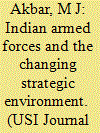

|
|
|
| 7 |
ID:
170792
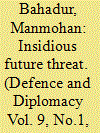

|
|
|
| 8 |
ID:
087045
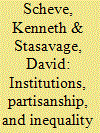

|
|
|
|
|
| Publication |
2009.
|
| Summary/Abstract |
It has been widely suggested by political scientists and economists, based on empirical evidence for the period since 1970, that the institution of centralized wage bargaining and the presence of a government of the left are associated with lower levels of income inequality. The authors make use of new data on top income shares as well as long-run series on wage inequality to examine the effects of partisanship and wage bargaining over a much longer time period, nearly the entire twentieth century. Their empirical results provide little support for the idea that either of these two factors is correlated with income inequality over this period. They then show that a closer look at the introduction of centralized wage bargaining in individual countries during the middle part of the twentieth century reveals that in countries that moved to centralize wage bargaining, income inequality had already been trending downward well before the institutional change, that the move to centralized bargaining did not alter this trend, and that these changes in income inequality were also observed in countries that did not adopt centralized wage bargaining at this time. The results suggest that there were alternative institutional paths to reduced income inequality during most of the twentieth century. This raises the possibility that either structural economic changes or commonly shared economic and political events, such as world wars and economic crises, may ultimately be more important for understanding the evolution of income inequality than are the institutional or partisan characteristics commonly considered to be decisive by political scientists.
|
|
|
|
|
|
|
|
|
|
|
|
|
|
|
|
| 9 |
ID:
123946
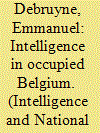

|
|
|
|
|
| Publication |
2013.
|
| Summary/Abstract |
During both World Wars, one of the most powerful weapons Belgian citizens possessed in resisting German occupation of their country was the gathering of intelligence on the enemy for the allied armies. But Belgian's first and second secret wars were different in several respects, one of the most important being the relationship between the Belgian secret services in exile and their British counterparts. If the First World War was essentially a story of bitter concurrency between them, the Second was mostly a tale of 'jealous' partnership. The relations with the intelligence networks in occupied Belgium formed a delicate but crucial issue, where money played an important role. This article explores these dynamics and how they affected the main mission of gathering intelligence on the Germans.
|
|
|
|
|
|
|
|
|
|
|
|
|
|
|
|
| 10 |
ID:
128913
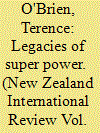

|
|
|
| 11 |
ID:
148642
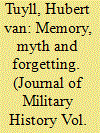

|
|
|
|
|
| Summary/Abstract |
The Netherlands’ escape from the ‘hard hand of war’ in 1914-1918 was explained until this century through several myths, all of which painted the country as a passive player during the war. That these myths are now discredited is not new. What has been given little attention, however, is the impact of these myths on the Netherlands’ preparation for the next war, which it would not escape. The consequences of the country’s faulty historical memory would have an impact well beyond its own borders.
|
|
|
|
|
|
|
|
|
|
|
|
|
|
|
|
| 12 |
ID:
102319
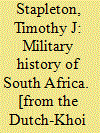

|
|
|
|
|
| Publication |
Santa Barbara, Praeger, 2010.
|
| Description |
xi, 229p.
|
| Standard Number |
9780313365898, hbk
|
|
|
|
|
|
|
|
|
|
|
|
Copies: C:1/I:0,R:0,Q:0
Circulation
| Accession# | Call# | Current Location | Status | Policy | Location |
| 055744 | 355.00968/STA 055744 | Main | On Shelf | General | |
|
|
|
|
| 13 |
ID:
152422
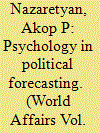

|
|
|
|
|
| Summary/Abstract |
Akop P Nazaretyan argues that historical determining factors are mostly of a mental nature. The state of and fluctuations in mass consciousness, the ambitions and talents of authoritative leaders and other such “subjective” factors frequently determine social events more forcefully than “objective” factors.
|
|
|
|
|
|
|
|
|
|
|
|
|
|
|
|
| 14 |
ID:
133409
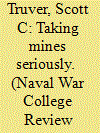

|
|
|
|
|
| Publication |
2012.
|
| Summary/Abstract |
A mine is a terrible thing that waits. The easy way is always mined. Any ship can be a minesweeper-once. Sea mines and the need to counter them have been constants for the U.S. Navy since the earliest days of the Republic. In January 1778, patriot David Bushnell used floating kegs of gunpowder fitted with contact firing mechanisms to attack a British fleet anchored in the Delaware River above Philadelphia. Four British sailors died trying to retrieve the kegs-an early example of the challenges of explosive ordnance disposal (EOD) against an unknown threat-but the ships were unscathed. Since that uncertain beginning, mines and mine countermeasures (MCM) have figured prominently in the Civil War, Spanish-American War, both world wars, Korea, Vietnam, numerous Cold War crises, and Operations DESERT STORM and IRAQI FREEDOM.
|
|
|
|
|
|
|
|
|
|
|
|
|
|
|
|
| 15 |
ID:
079240
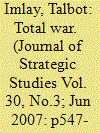

|
|
|
|
|
| Publication |
2007.
|
| Summary/Abstract |
This article reviews the five volume series, published by Cambridge University Press, on the history of total war from the American Civil War and Wars of German Unification to World War II. The discussion focuses on two questions: how to define total war; and is total war a useful conceptual tool for understanding warfare during this period? Although the editors were unable to come up with a definition of total war, they did identify elements or tendencies that together contributed to the growing totalization of war during the nineteenth and especially twentieth centuries. Regarding the second question, the editors suggest that total war is best thought of as an ideal type, one to which reality can approach but never reach. If this use of total war facilitates comparison between wars (and different aspects of one war) by providing a common standard, it leaves open the question of how to undertake such a comparison.
|
|
|
|
|
|
|
|
|
|
|
|
|
|
|
|
|
|
|
|
|